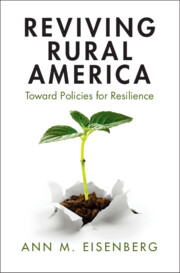Book contents
- Reviving Rural America
- Reviving Rural America
- Copyright page
- Contents
- Figures
- Acknowledgments
- 1 Introduction
- 2 The Foundational Myths
- 3 The Myth of Rural Empowerment
- 4 The Myth of Rural Unsustainability
- 5 The Myth of Rural Decline
- 6 The Myth of Rural Radicalism
- 7 The Myth of Rural Whiteness
- 8 The Myth of Rural Obsolescence
- Index
6 - The Myth of Rural Radicalism
Published online by Cambridge University Press: 20 June 2024
- Reviving Rural America
- Reviving Rural America
- Copyright page
- Contents
- Figures
- Acknowledgments
- 1 Introduction
- 2 The Foundational Myths
- 3 The Myth of Rural Empowerment
- 4 The Myth of Rural Unsustainability
- 5 The Myth of Rural Decline
- 6 The Myth of Rural Radicalism
- 7 The Myth of Rural Whiteness
- 8 The Myth of Rural Obsolescence
- Index
Summary
This chapter addresses the widespread perception that rural politics are characterized by irrational antigovernment sentiment, right-wing conspiracy theories, and other ideological drivers. This perception includes the stereotype that rural residents are generally conservatives who “vote against their interests” when liberal policies might appear to help their communities more. The chapter argues that rural views on government are just as often rational reactions to the unique impacts of law, regulation, and government in rural communities. Drawing on legitimacy theory, the chapter argues that rural grievances toward the federal regulatory state specifically reflect predictable concerns relating to procedural justice, substantive outcomes, and a sense that agencies prioritize concerns other than rural residents’ concerns. Although rural views vary, and intersect with other identities such as race, diverse rural populations exhibit common concerns about agencies posing threats to livelihoods and failing to offer protection from environmental threats. The chapter argues that overlap between subjective rural sentiments and objective structural features of the regulatory state lend credence to rural views as not irrational. Barriers to public participation in agency rulemaking, regulatory cost–benefit analysis, and implementation of the Endangered Species Act all illustrate instances of the regulatory state often failing to take meaningful rural concerns seriously.
Keywords
- Type
- Chapter
- Information
- Reviving Rural AmericaToward Policies for Resilience, pp. 130 - 155Publisher: Cambridge University PressPrint publication year: 2024

